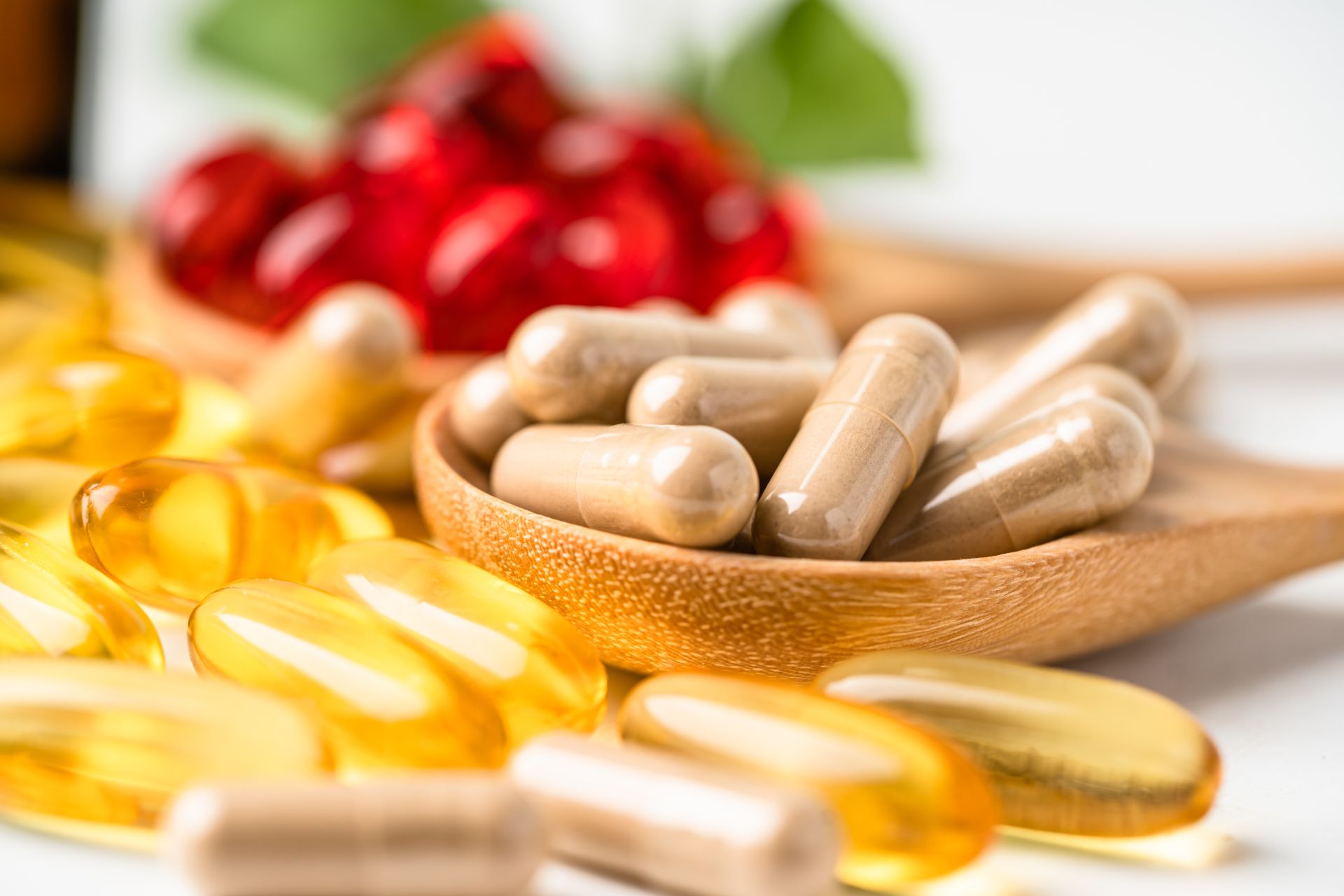heading_title

The use of dietary supplements may seem like an easily accessible yet simple way to provide adequate amounts of vitamins and minerals, as well as bioactive compounds with health-promoting properties. Many people wonder how to properly select dietary supplements for themselves to get the expected health and performance benefits. Let's find out which vitamins and dietary supplements can actually be useful in the right situations.
- Vitamin D - important for everyone
- Vitamins and supplements for vegans
- Vitamins and dietary supplements for pregnant women
- Vitamins and dietary supplements for women with PCOS
- Cholesterol-lowering dietary supplements
- Dietary supplements for athletes
Vitamin D - important for everyone
Vitamin D supplementation is necessary for the entire population, as vitamin D deficiency is common among residents of Poland, as well as the rest of Central Europe. Vitamin D deficiency is common in all age groups, and even more so in autumn and winter. Vitamin D is a compound with a wide spectrum of biological activity in the human body. It supports intestinal absorption of calcium and phosphate, regulates blood pressure and parathormone (PTH) secretion, and is responsible for bone formation. Vitamin D shows potential anti-inflammatory, antioxidant, anticancer, antidepressant and immunomodulatory properties. Epidemiological studies have shown that people with high levels of vitamin D in their blood have a lower risk of upper respiratory tract infections such as the common cold and flu, and fewer traumatic injuries and stress fractures. Since a well-balanced diet covers only up to 20% of daily vitamin D requirements, regular vitamin D supplementation at a daily dose of 2000-4000 IU during the fall and winter, or year-round if efficient skin synthesis of vitamin D during the spring and summer seasons is not possible, is necessary.
Vitamins and supplements for vegans
Studies have shown that a well-balanced vegan diet has many health benefits. However, vegans, like vegetarians, can be susceptible to low intake of certain macro- and micro-nutrients, among which are protein, certain essential amino acids, long-chain omega-3 polyunsaturated fatty acids (EPA and DHA), vitamin B12, vitamin D, iodine, iron, selenium, zinc and calcium. For this reason, it is very important for all vegans to constantly take properly selected vitamins and dietary supplements, such as vitamin B12, vitamin D and EPA and DHA fatty acids.
Vitamins and dietary supplements for pregnant women
Pregnant and lactating women experience an increased need for nutrients due to the needs of the developing baby. According to the current position of the Polish Gynecological Society, food components with proven beneficial effects on the pregnant woman and child include: long-chain omega-3 polyunsaturated fatty acids (especially DHA), folic acid, iron, iodine and vitamin D. Pregnant women should therefore be sure to properly select for themselves a dietary supplement containing the recommended vitamins, minerals and polyunsaturated fatty acids of the Omega-3 family.

Vitamins and dietary supplements for women with PCOS
Polycystic ovary syndrome (PCOS) is the most common endocrine disorder in women of reproductive age, affecting between 5 and up to 15% of women in their second decade of life. PCOS is associated not only with menstrual cycle abnormalities, but also metabolic disorders such as hyperinsulinemia, type 2 diabetes, hypertension, dyslipidemia (abnormal blood lipid and lipoprotein levels), and obesity and cardiovascular disease. Current research shows that there are several vitamins and dietary supplements that can effectively support the treatment of PCOS. Among them are listed: Vitamin D, EPA and DHA fatty acids, myo-inositol and d-chiro-inositol, N-acetylcysteine (NAC), quercetin, ellagic acid, cinnamon extract, melatonin, vitamin K2 (MK7), probiotics(Lactobacillus acidophilus, Lactobacillus casei and Bifidobacterium bifidum) and vitamin B12 in those women with PCOS who take metformin (an anti-diabetic drug) long-term. Some of these dietary supplements are recommended by experts of the Polish Gynecological Society for the treatment of PCOS.
Cholesterol-lowering dietary supplements
The WOBASZ and WOBASZ II multicenter nationwide population health surveys show that more than 70% of men and less than 65% of women have elevated total blood cholesterol levels. Those who have high cholesterol levels may want to consider including properly selected dietary supplements, such as fermented red rice extract or bergamot flavonoids. The former contains monacolin K, which contributes to a marked reduction in total cholesterol, the LDL (so-called bad cholesterol) and non-HDL fractions, as well as apolipoprotein B - strongly involved in the development of atherosclerosis of blood vessels. Patients using fermented red rice extract have a lower incidence of coronary incidents and deaths from cardiovascular disease. And the second dietary supplement contains bergamot flavonoids, which cause a significant decrease in total cholesterol and the LDL fraction, as well as an increase in the level of good cholesterol (HDL) in the blood.
Dietary supplements for athletes
There is a fairly narrow group of vitamins and dietary supplements that are actually recommended to athletes in certain situations by the Australian Institute of Sport, the American Institute of Sports Medicine and the International Olympic Committee. Dietary supplements with well-documented effectiveness in sports include creatine monohydrate, beta-alanine, caffeine, sodium bicarbonate, nitrates (concentrated beet juice) and protein supplements. Using properly selected dietary supplements helps athletes develop muscle mass and physical performance, as well as speed up the rate of post-workout recovery. Athletes should also take vitamin D on a regular basis, which can have beneficial effects on body composition, resting metabolism and physical performance, as well as the prevention of injury and trauma, especially in those with vitamin D deficiency.
Sources:
-
Kaufman MW, Roche M, Fredericson M.: The Impact of Supplements on Sports Performance for the Trained Athlete: A Critical Analysis. Curr Sports Med Rep. 2022 Jul 1;21(7):232-238.
-
Peeling P, Binnie MJ, Goods PSR, et al: Evidence-Based Supplements for the Enhancement of Athletic Performance. Int J Sport Nutr Exerc Metab. 2018 Mar 1;28(2):178-187.
-
Wierzejska RE: Dietary Supplements-For Whom? The Current State of Knowledge about the Health Effects of Selected Supplement Use. Int J Environ Res Public Health. 2021 Aug 24;18(17):8897.
-
Zhang FF, Barr SI, McNulty H, et al: Health effects of vitamin and mineral supplements. BMJ. 2020 Jun 29;369:m2511.
-
Shi Z, Yan A.: Dietary Supplements: Are Current Policies Adequate for Promoting Health? Nutrients. 2020 Nov 11;12(11):3449.
-
Batsis JA, Apolzan JW, Bagley PJ, et al: A Systematic Review of Dietary Supplements and Alternative Therapies for Weight Loss. Obesity (Silver Spring). 2021 Jul;29(7):1102-1113.
 ⮜ Previous article
⮜ Previous article
Street Workout - what is it?
 Next article ⮞
Next article ⮞